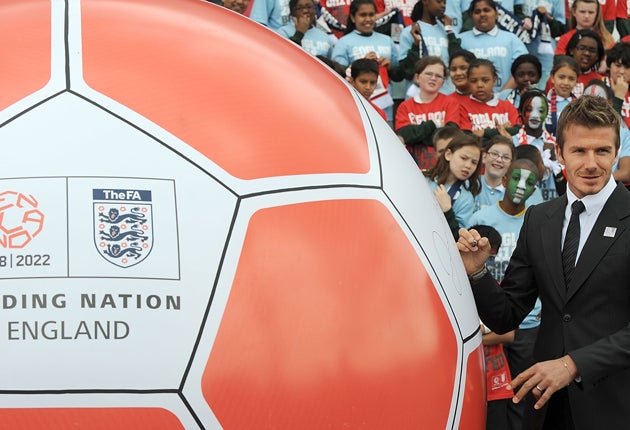100 days to go: England are team to beat
Fifa bigwigs arrive to examine the leading 2018 World Cup bid – but the Russians are coming

Your support helps us to tell the story
From reproductive rights to climate change to Big Tech, The Independent is on the ground when the story is developing. Whether it's investigating the financials of Elon Musk's pro-Trump PAC or producing our latest documentary, 'The A Word', which shines a light on the American women fighting for reproductive rights, we know how important it is to parse out the facts from the messaging.
At such a critical moment in US history, we need reporters on the ground. Your donation allows us to keep sending journalists to speak to both sides of the story.
The Independent is trusted by Americans across the entire political spectrum. And unlike many other quality news outlets, we choose not to lock Americans out of our reporting and analysis with paywalls. We believe quality journalism should be available to everyone, paid for by those who can afford it.
Your support makes all the difference.London, Manchester, Newcastle and Sunderland will be the potential World Cup host cities visited by Fifa's inspection team over the next four days, the English bid committee announced last night.
The inspectors, who will then compile a crucial technical report about what they have seen, are doing the rounds of countries competing to stage the 2018 and 2022 tournaments, the result of which will be declared on 2 December, 100 days from Tuesday.
Led by Harold Mayne-Nicholls, president of the Chilean FA, the six-man delegation also includes Danny Jordaan, chief executive of the local organising committee at the South African World Cup. They visited Holland and Belgium (who are running a joint bid) in July and last week were in Russia, now regarded as England's closest rivals.
Leeds, Sheffield, Liverpool, Birmingham, Nottingham, Milton Keynes, Bristol and Plymouth are the other venues earmarked in the English bid; Derby, Leicester and Hull having been were dropped last December, partly in response to the desire for a wider geographical spread than was seen in either 1966 or at Euro 96. The previous English World Cup was based on London, Birmingham, Sheffield, Liverpool, Manchester and the North-east; 30 years later, the spread was much the same, with Nottingham and Leeds added.
Both those tournaments comprised only 16 teams, but a 32-team World Cup offered the chance to include the West Country as well as one or two venues not in the Premier League; what Lord Mawhinney of the bid committee called "a sprinkling of tomorrow". Hence the presence of Plymouth and Bristol, as well as Milton Keynes. Plymouth Argyle are committed to doubling the current capacity of Home Park to the minimum requirement of 40,000 and Bristol City need to build a new stadium altogether, which Nottingham Forest are also promising.
There is uncertainty over whether Liverpool will deliver a new Anfield or simply update the current stadium. Down in London, which is allowed three venues, no decision has yet been taken on whether Wembley and the Emirates will be joined by Tottenham's new ground or the Olympic stadium.
None of that need worry Fifa's inspectors. No bidding country yet has the requisite number of ultra-modern grounds with the required capacity, which increases to 60,000 for quarter-finals onwards and 80,000 for the final. Russia has more work to do than anyone, yet bookmakers now make them second favourites behind England, just ahead of Spain/Portugal.
It is one of the oddities of the bidding that two of the four Europeans are proposing joint hosts. After Japan and South Korea staged the 2002 World Cup, complications arising from having two different local organising committees, languages, currencies and cultures seemed to have persuaded Fifa that a single country made greater sense. Not for the first (or fifth) time, however, Sepp Blatter has changed his mind about a crucial issue. In January last year, Fifa officials were still suggesting that single bids were greatly preferable, but the two joint ones were duly accepted when the final deadline for submissions was reached in May. Spain, hosts in 1982, would seem to have had a stronger case on their own and only recently, and reluctantly, decided not to jettison Portugal. But Angel Villar, the influential president of the Spanish federation, now claims: "We believe we are even stronger in partnership with Portugal because that represents the power of the Iberian peninsula. The Portuguese can bring to the table all their organising expertise from the 2004 European Championship."
Russia are widely regarded as the greatest threat, not least because of a perceived mood among many leading sports bodies to award major tournaments to countries that have not staged them before, rather than just returning to established safe choices.
Sometimes this is tied up with elections for important posts, sometimes not. Thus Blatter's re-election campaign was hardly hindered by making an early public declaration that Africa should have a World Cup, which finally came to pass this summer.
The notion that the finals should simply rotate from continent to continent has been modified, but the clear implication is that Europe should have it in 2018 and under a new rule would be ineligible for 2022, when the contestants would be Australia, the United States, Japan, Qatar and South Korea.
Partisanship aside, England would appear to have the strongest case of all, in terms of stadiums, infrastructure and experience of major events. The notion of "the home of football" has, however, been carefully avoided, the feeling being that a certain arrogance associated with the phrase proved counter-productive in the embarrassing failure of the campaign to stage the 2006 tournament.
Whether the best bid wins is, of course, another matter, dependent on the whims and affiliations of the 16-man Fifa executive committee who will vote in just over three months' time.
Join our commenting forum
Join thought-provoking conversations, follow other Independent readers and see their replies
Comments